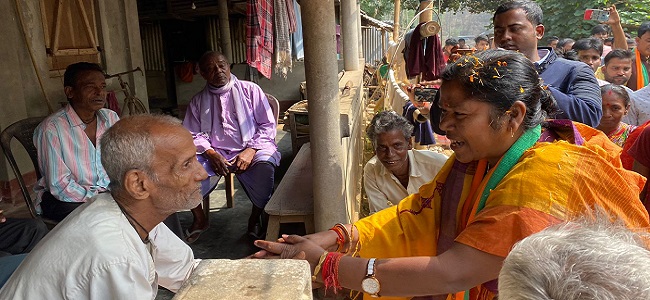Kolkata: Anemia is one of the widespread conditions in India with more than 50 percent pregnant women are found to be suffering from this condition. And, it is also increases the risks of Postpartum hemorrhage (PPH), one of the leading causes of maternal mortality across India and in Kolkata as well, by ten-folds. If a woman is planning a pregnancy, then it’s mandatory to get herself investigated for antenatal anemia to reduce the morbidity associated with PPH.
Dr Abinibesh Chatterjee, Consultant Gynaecologist Columbia Asia and Sanjeevani Hospital Kolkata says postpartum bleeding is the quickest of maternal killers and it can kill even a healthy woman within two hours, if not treated. A woman during her pregnancy and even prior to pregnancy should get herself assessed against anemia and other risk factors assessment and treatment.
“PPH may result from failure of the uterus to contract adequately (atony), genital tract traua (vaginal or cervical lacerations), uterine rupture, retained placental tissue, or maternal bleeding disorders. Uterine atony is the most common cause and consequently the leading cause of maternal mortality worldwide. Clinicians must be aware of risk factors for PPH and should take these into account when counselling women about place of delivery. Women with known risk factors for PPH should only be delivered in a hospital with a blood bank on site. Antenatal anemia should be investigated and treated appropriately as this may reduce the morbidity associated with PPH,” said Dr Chatterjee.
Bharat Serums and Vaccines Limited (BSV), which is a leader in women healthcare products and solutions, has recently unveiled a new women’s health product “Carbetocin”. It’s an injectable drug which is currently recommended for prevention of Postpartum hemorrhage. There are many such drugs available in the market but very few doctors are aware of them and such advancements should be addressed in Continuous Medical Educations (CMEs) and conferences.
One of the effective strategy to prevent postpartum hemorrhage is active management of the third stage of labor (AMTSL) Carbetocin IV or IM.
“Addressing the identified factors could enhance early prevention of PPH among childbearing women. Placing emphasis on developing strategies for early detection of women at higher risk of developing PPH, continuous professional development of health care providers, developing educational materials for CHWs and family members could improve the prevention of PPH. Involvement of all levels of the health system was recommended for a proactive prevention of PPH. Further quantitative research, using case control design is warranted to develop a screening tool for early detection of PPH risk factors for a proactive prevention,” Dr Chatterjee added.
Postpartum hemorrhage can be quite serious. However, quickly detecting and treating the cause of bleeding can often lead to a full recovery. Some of the complications of Postpartum hemorrhage include immediate shock, coagulopathy, Renal failure, Operative interventions and related complications, Pulmonary edema, Peripartum Hysterectomy and its complications.
Most patients with PPH are quickly identified and successfully treated before major complications develop. The most common problem is anemia and loss of iron stores, which results in fatigue in the postpartum period. Clinicians and patients are more tolerant of low hemoglobin levels, mild postural lightheadedness, and fatigue because of current concerns over blood transfusion. The risks of transfusion with blood products are well known. Not surprisingly, many of the complications of severe PPH are related to massive blood loss and hypovolemic shock. Damage to all major organs is possible; respiratory (adult respiratory distress syndrome) and renal (acute tubular necrosis) damage are the most common but are rare. These conditions are best managed by specialists,” he said.
The Press Release/Article has not been Edited by The Reporting Today.






